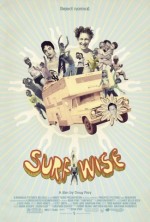2008 // USA // Louis Leterrier // July 7, 2008 // Theatrical Print
B - The Incredible Hulk surprised me. It is a superhero film that wallows in its genre conventions with almost no joy, a kind of Twelve Steps out of Hell served up as popcorn entertainment. Perhaps this shouldn’t be so unexpected. The Hulk, after all, is one of Marvel’s darkest heroes. Lacking Spider-Man’s humor or the X-Men’s warmth, the Hulk comics principally offer rage, anxiety, and the peculiar kind of fatalistic despair. Louis Leterrier’s sequel-slash-reboot of Ang Lee’s gloriously overreaching Hulk never really rises to any kind of greatness. Indeed, it often feels overly familiar. (The thickly applied nods to the Bill Bixby television series might be partly to blame for this.) Yet The Incredible Hulk gives this year’s best superhero film to date, Iron Man, a run for its money. It does this not with mesmerizing performances or thematic heft, but with a precise awareness of how a Hulk film should be realized, and in particular how to balance the terror and empathy for the big green lug.
Leterrier picks up where Lee left off, but also dramatically revises what has come before. The Incredible Hulk opens with a rapid-fire credit sequence that takes us through the re-imagined origin of the creature lurking inside Bruce Banner. Leterrier’s version cribs from the Bixby series, right down to the iconic image of Bruce (Edward Norton) with those menacing crosshairs of light sliding over his face. Fortunately, this opening sequence is a fine example of breakneck storytelling, a visual debriefing to bring the whole audience up to speed—regardless of whether they have seen Lee’s film or the television series, or read any Hulk comics. Those of us in the geekier set already know the score: Banner’s experiments in radiation resistance led to an accident that transformed him into a ferocious green ogre. The effect was temporary, but the fugitive Banner now risks the terrifying change whenever he becomes agitated.
The Incredible Hulk reunites us with Banner in a Brazilian slum, where he is laying low, working menial jobs, and practicing meditative techniques to control his transformations. He is also collaborating with an Internet pal named Mr. Blue—by means of a battered laptop and crude laboratory equipment—to try to perfect an outright cure for his condition. However, the United States military finally catches up to Banner, in the form of General Thaddeus Ross (a distractingly mustachioed William Hurt) and Special Forces tough Emil Blonsky (a stubbly, oily Tim Roth). This sets off the first of the film’s three major action set pieces, all of which are extraordinarily fun. The Incredible Hulk’s finest achievement is how deftly the filmmakers execute the mayhem, which, in any Hulk blockbuster worth its salt, should be the centerpiece, after all. There’s nothing particularly innovative about how the action is realized, but it’s done with a remarkable intelligence and precision of tone.
Each of the major set pieces, for example, raises the stakes in elementary but crucial ways. In the first showdown between the Hulk and the military, the green beast is only glimpsed through shadow and smoke. During the second round, Leterrier gives us a brutal confrontation in a wide-open space and full sunlight. The climax pits the Hulk against an equally powerful but more monstrous foe, the Abomination, on the streets of New York City. This is action storycraft at its most elegant, yet an all-too-rare thing in the age of big-budget excess.
Most vitally, The Incredible Hulk summons exactly the right sensation of seat-gripping tension with its action. It offers a richly satisfying blend of sheer free-fall terror and sympathetic fear for Banner’s fate, a gestalt thrill that fuses two distinct anxieties: A) “Can the Hulk be stopped?”; and B) “I hope the Hulk doesn’t get hurt.” By nailing this tricky balance, Leterrier lets us slip into Banner’s psychological space, and that of his erstwhile girlfriend, Betsy (Liv Tyler). Will the film’s action be as stirring on a second viewing? Hard to say.
In most other respects, The Incredible Hulk is passable summer entertainment. The script is mostly content to stick to an overly grave B-movie tone, and none of the performers—alas, even Norton—bring much to the table. If the action sequences are marvelously unpredictable, everything in between suffers from the usual blockbuster triteness. To be fair, the film never veers into stupidity, or even (most of the time) boredom. Leterrier and the actors keep the material sufficiently smart and snappy to engage. There’s just not much that’s surprising. Roth gets the best scenery-chewing—Why do none of the other characters seem to sense that he is a sociopath?—and Tim Blake Nelson has an amusing but oddly dissonant role as a scientist who aids Banner.
For Marvel-philes, the filmmakers sneak in plenty of tempting tidbits. There are references to the research program that created Captain America, and a possible origin for Hulk’s hyper-intelligent nemesis, The Leader. The film also provides a connection to Iron Man that comes as a pleasant surprise, another thread pulling the cinematic Marvelverse together.
The challenge of The Incredible Hulk is that it may be too bleak for some viewers. It’s not especially bloody or gruesome, and hardly the most existential superhero film to come along in recent years. Yet what Leterrier and screenwriter Zak Penn deliver is a relatively thin story, a mere chapter in the life of a man struggling for control. There is little revelation or redemption to be had in The Incredible Hulk. Norton’s Banner, like Bixby’s, must keep hiding and keep moving. This film is just one stop on his long, never-ending flight.









